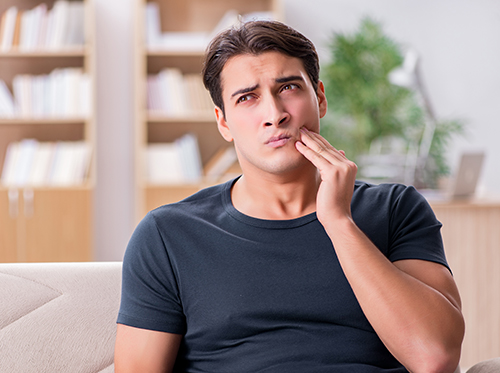December 11th, 2024

Your feedback is very important to us at Oral and Maxillofacial Surgery of Coastal Georgia. We always want to make sure that our practice is meeting its full potential, so whether you’ve visited Dr. Theodotou once or been a loyal patient throughout the years, we encourage you to share your thoughts about your experience with us!
You can do this easily by giving us a review on our Facebook page or writing down your comments below. If you feel more comfortable, you’re always welcome to give our Pooler office a call, too! We feel fortunate to have you all as patients and look forward to reading all your feedback!
December 4th, 2024

When you chip a tooth badly, it can be a very nerve-wracking situation. Dr. Theodotou and our team want to provide you with some information that can help if you ever suffer a chipped or broken tooth. The most common ways people break their teeth are by biting down on something hard, getting hit in the mouth, falling down, or developing cavities that weaken the tooth and allow it to be broken easily. There are a few things you can do if you find yourself in this situation, however.
First, we recommend that you investigate whether the tooth is partially chipped or completely broken. Unless you are experiencing a lot of pain or bleeding, this should not be treated as an emergency. You may call our office and we will try to schedule an appointment with you as soon as possible. Once we have evaluated the tooth during your appointment, we can start to treat it. For minor chips or cracks, we may simply smooth out the area or fill in the space so the crack doesn’t spread.
If your teeth show severe damage such as a serious break, split tooth, split root, or a decay-induced break, Dr. Theodotou may need to take more time to fix the problem. If you need emergency dental care because a tooth has fallen out, call our practice immediately to schedule an appointment for that day. If you’re waiting for an emergency appointment, you can rinse your mouth with warm salt water and apply slight pressure to the area to stop the bleeding. We recommend using an ice pack to reduce swelling, but do not take any aspirin because that may increase the bleeding.
If your tooth has completely fallen out of the socket, hold it by the crown and rinse it under running water. Do not let the tooth become dry; instead, place it in salt water or milk until you get to our office. Dr. Theodotou will determine whether the broken tooth can be salvaged or will need to be completely replaced.
We know how upsetting it can be to chip or break a tooth, which is why we want to guide you through this process. Most chipped teeth are usually just cosmetic problems, fortunately, but we know that dental emergencies can come up rather suddenly. Be sure to schedule an appointment at our Pooler office as soon as an emergency situation occurs.
November 27th, 2024

If you have been thinking about getting a piercing, or if you already have one or more, there are some health risks our team at Oral and Maxillofacial Surgery of Coastal Georgia wants you to know about. It's important to know the risks involved with oral piercing, including infection, chipped teeth, gum damage, nerve damage, loss of taste, or tooth loss that could occur as a result.
Your mouth contains millions of bacteria, and infection is a common complication of oral piercing. Many people who have piercings tend to regularly touch them, paving the way for bacteria to enter piercing sites. Also, food particles that collect around piercing sites can lead to infection.
Besides hindering your ability to talk and eat, oral piercing also leads people to develop a habit of biting or playing with their piercings, which can lead to cracked or fractured teeth. While the fracture can be confined to the enamel of the tooth and require a simple filling, you also run the risk of the fracture going deep into the tooth, which may require a root canal, tooth extraction, and additional dental treatment.
If you still decide to get an oral piercing, you should realize that it will take some time to heal (anywhere between four to six weeks) and it may be very uncomfortable. Also please keep in mind that it will be an added responsibility to your life, as it will require regular upkeep. We want you to make sure that you’re committed to the task of taking care of it for the full healing period and beyond.
We encourage you to clean the piercing with antiseptic mouthwash after eating, and brush the jewelry each time you brush your teeth. If you have any questions, please don't hesitate to give us a call!
November 20th, 2024

Although using mouthwash is certainly not the equal of brushing and flossing, it does have benefits for your dental hygiene. If you use mouthwash regularly, you should find out which type is best suited for your needs. Here are some things to think about the next time you’re at the store.
The first item to weigh is why you want to use mouthwash. If the reason involves a high risk for cavities, you should focus on a mouthwash that contains fluoride. Make sure to double-check the label, because some mouthwashes do not necessarily include fluoride.
If you’re looking for a mouthwash to fight gingivitis, select an oral rinse with antibacterial properties. Make sure to read labels and avoid picking one that contains alcohol. Antibacterial mouthwash would also be best for a patient who has periodontal disease.
Another option is prescription mouthwash. These should be discussed with Dr. Theodotou and/or your pharmacist in order to avoid negative side effects. Pay close attention to the directions regarding how much to use and for how long. Keep in mind that some brands may lose their effectiveness if you use them on an ongoing basis.
For children, you can find a mouthwash that changes the color of plaque on their teeth. This is a fun way to help them understand how well they are brushing, and what areas they need to focus on. It can even be a tool for adults who have trouble reaching certain areas of their mouth.
While mouthwash is generally considered as a safe means to improve your oral health, you need to keep certain things in mind. Avoid using any mouthwash that has alcohol in it. If you are using a strong one, it can reduce your sense of taste over time. Be wary of a mouthwash that claims it can loosen plaque; this is not accurate and can mislead consumers.
We hope these simple suggestions will help you the next time you’re at the store. Make sure you pick the right mouthwash to keep that healthy smile! Feel free to contact Dr. Theodotou at our Pooler with any questions you may have.






 Website Powered by Sesame 24-7™
Website Powered by Sesame 24-7™